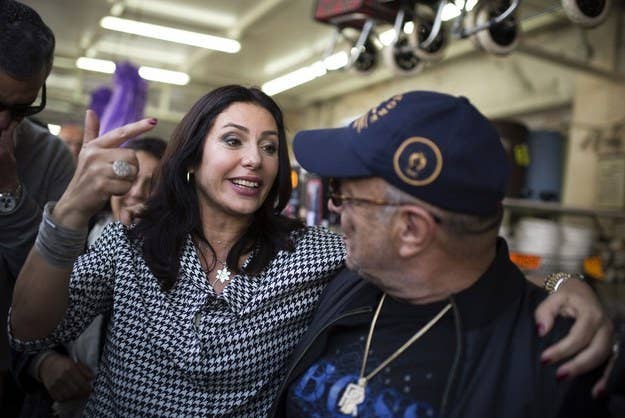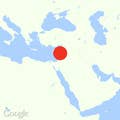
JERUSALEM — Haim Asaf couldn't believe his luck when, earlier this week, Likud lawmaker Miri Regev stopped at his small produce stall during a campaign stump at Jerusalem's iconic Machane Yehuda market. He was so excited, he said, that he barely saw that Israeli Prime Minister Benjamin Netanyahu was just a few steps behind.
"She is so small, so sharp, with a very pretty face. I wish I could have taken a photo with her smelling my oranges!" said Asaf, with the high-pitched squeal of a teenager talking about a favorite pop star. "After her, seeing Netanyahu was kind of a letdown."
With Israeli elections just five days away, women are taking a central role in the political scene. Internal party polls, shared with BuzzFeed News this week by campaign strategists from all of Israel's largest parties, show that it is the women on the party list who enjoy the greatest approval ratings among voters, who see them as the real voice of the party. It's women, say Israel's top political strategists, who will win the elections for Israel's next prime minister.
"We are pushing the women to do more campaign events, to appear in more ads," said one Likud Party strategist, who spoke on background as he was not authorized to speak to the press. He said it was an "open secret" in Likud that Regev had the highest approval ratings in the party, far surpassing Netanyahu, due to her often controversial and highly conservative stances. "She is aggressive, but the core Likud voters love her for that. When she comes out people respond."
In Jerusalem, Asaf — a second-generation grocer in the market — was hardly the only one to be blinded by Regev's celebrity. Gloating over their reputation as a bastion of support for the Likud Party, the shopkeepers at Machane Yehuda market could be heard chattering about Regev's appearance long after Netanyahu's motorcade left the market.
Few could help noticing that when Netanyahu stopped at a coffee shop in the market and bought a $3 espresso with the equivalent of a $30 bill, the woman behind the counter gave him his change entirely in small coins. The gesture was meant as a protest against his economic policies, which she said harmed small businesses. Regev, on the other hand, stayed back and got a free bag of chocolates from a smiling admirer.
"Regev says the things that Netanyahu is afraid to say. She seems more honest, more direct, and more of what we in the Likud want," said Asaf, 51, who has voted for the Likud Party for nearly 20 years. Where others see controversy in her comments at a protest where she called Sudanese refugees in Israel a "cancer" or her smiling statement to one Israeli TV news network that she was "happy to be a fascist," Asaf sees a straight-talker. "I wish I was voting for her to be the prime minister instead of Netanyahu."
Israeli political pundits say it is no wonder that hardline conservatives like Regev play well to Likud's core voter base, which polls indicate has grown increasingly right-wing over the years. Lawmakers who were once considered fringe politicians, such as Moshe Feiglin, an outspoken pro-settlement leader, now enjoy considerable popularity within the Likud.
Tal Schneider, an Israeli politics reporter who runs the popular plog blog, said that she often hears Likud voters saying they will vote for the party because of outspoken conservatives such as Regev.
"On the campaign trail with her last week, people were hugging her and cheering whenever Regev approached," said Schneider. "They see her as more authentic than Netanyahu."
It's not just Likud that is benefiting from the women on its party list. In Labor, the highest approval ratings are consistently given to the spirited Stav Shaffir, who became the youngest-ever lawmaker in the Israeli parliament when she was sworn in at the age of 27 in 2013. One Labor Party strategist, who spoke to BuzzFeed News on condition of anonymity since internal party polls are not made public, said that if Shaffir had taken part in the party debates, it could have won the party another seat or two in the Knesset. Minister Tzipi Livni, who joined with Labor leader Isaac Herzog to run on a joint list, is not nearly as popular as Shaffir, said the strategist.
"Livni is seen as one of the old school types, one of the guys, and in this case it works against her," said the strategist. "It's the women who speak out, who take a stance, that voters are responding to."
In the Yisraeli Beiteinu Party, the only politician to appear in an advertisement besides the party leader, Avigdor Lieberman, was female candidate Orly Levy-Abekasis. In the Jewish Home Party, the young secular Ayelet Shaked has soared to the No. 2 slot in a political group otherwise dominated by religious settlers. And in the Joint Arab List, the newly formed union of several of the Arab Parties, it is the fiery lawmaker Haneen Zoabi, who polls highest among voters, despite her relatively new standing in the party.
"I think that during these elections, people care more about, and spend more time discussing social issues," said Lahav Harkov, the parliamentary correspondent for the Jerusalem Post.
Schneider said that these elections were seeing an uptick in women's issues being discussed. Polls released last week by Israel's Central Bureau of Statistics show huge gaps between the earnings of male and female workers, with men's average monthly salary 31.9% higher than the average woman. Women also account for only one-third of managerial positions in Israel, according to the bureau.
Relative political newcomers Yair Lapid, of the Yesh Atid Party, and Moshe Kahlon, of the Kulanu Party, have both released campaign ads in the last week focusing on women's issues.
View this video on YouTube
"Women's issues is not something politicians can afford to ignore, because it is now something Israelis care more about," said Schneider. "When people noticed that Netanyahu, year after year, didn't have any females in his inner circle — when they noticed he was only surrounded by white men, well, that is something they slammed him for. Why doesn't he promote women?"
While Israel is one of the few countries in the region to have elected a female head of government, Golda Meir, Israeli female lawmakers have made few inroads into the halls of power in the four decades since. According to polls, women are poised to take at least as many, if not slightly more than, the 27 seats they currently hold in Israel's 120-seat parliament.
"I'd say that women are more of an issue for people today than they were five or ten years ago, even if they still only have one-fourth of the Knesset," said Maor Remez, a mother of three who lives near Jerusalem's Machane Yehuda market, and who brought her oldest son to meet Regev during the campaign stump. "Maternity leave, equal pay for equal work, anti-sexism laws, these are things I look at now when I vote, which I didn't pay attention to ten years ago."
Her son, aged 10, said he was disappointed that he didn't get to shake hands with Netanyahu. The small photo he had taken with Regev on his iPhone seemed like a small consolation.
"He's still a boy, he still thinks Israeli leaders have to be old men. By the time he's old enough to vote, I hope that has changed," said Remez. "Maybe one day he'll tell people he has a photo of himself as a child with the prime minister of Israel."


